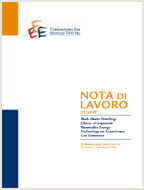Knowledge Creation between Integrated Assessment Models and Initiative-Based Learning – An Interdisciplinary Approach

24.10.2016
Enrica De Cian (Fondazione Eni Enrico Mattei, CMCC); Johannes Buhl (Wuppertal Institute for Climate, Environment, Energy); Samuel Carrara (Fondazione Eni Enrico Mattei, CMCC); Michela Bevione (Fondazione Eni Enrico Mattei, CMCC); Silvia Monetti (Wuppertal Institute for Climate, Environment, Energy); Holger Berg (Wuppertal Institute for Climate, Environment, Energy)
O31, O33, O35, Q42
Social Learning, Innovation Diffusion, Technology Adoption, Integrated Assessment, Case Study, Transition Research, Initiative-based Learning, Solar PV Learning Curves
Mitigation, Innovation and Transformation Pathways
Massimo Tavoni
This paper explores the opportunities for integrating Initiative Based Learning (IBL) and Integrated Assessment Models (IAMs) in order to improve our understanding of learning in the context of societal transition pathways, and more specifically by focusing on solar PV as an energy transition technology. Our analysis shows that IAMs and IBL conceptualize learning in a very different way, and the two approaches have major structural differences with respect to the geographical as well as the temporal scale of analysis. This is also due to the different goals of the two methodologies. The aim of IAM is to develop long-term energy and technology scenarios for the next thirty to eighty years, and to describe learning processes mostly to account for future potential improvements in technologies, while IBL focuses on understanding the configuration of actors in specific institutional settings that legitimize and support specific technologies and ultimately lead to dynamics of social learning. Although ambitious forms of integration between IAMs and IBL are not feasible today, the two approaches can be used in parallel and lead to mutual enrichment via a process that we label a two-way recursive collaboration.
***
Suggested citation: De Cian, E., J. Buhl, S. Carrara, M. Bevione, S. Monetti, H. Berg, (2016), ‘Knowledge Creation between Integrated Assessment Models and Initiative-Based Learning – An Interdisciplinary Approach’, Nota di Lavoro 66.2016, Milan, Italy: Fondazione Eni Enrico Mattei
